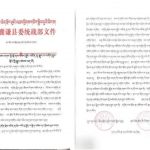
A copy of the order issued on December 25
Officials in Nangchen County, Qinghai province have banned informal Tibetan language classes being taught in monasteries. An order, issued December 25, called on Communist Party cadres responsible for managing monasteries in the region to “understand the harmful nature of monasteries running open schools.”
Tibetan students returning home during the winter holidays have, in recent years, brushed up on their native language by studying poetry and literature with monks and other volunteers at monasteries. One source claimed, “These informal classes are not related to political issues at all! They are purely education for the students.”
The Chinese state media the Global Times has reported that Jiang, a Chinese official from Quni village, stated that the classes were unnecessary because claims made by various monks in the area that Tibetan students studying in other parts of China have few opportunities to expose themselves to their native language were false.
Sonam, from the Nangqen publicity department, backed up these claims stating, “The Nangqen government has always been promoting bilingual education (Putonghua and Tibetan) in schools, and encourages students to learn Tibetan in qualified institutes.”
According to Jiang, the monks were also attempting to “infuse students with ideas that threatened social stability”. He added that the monks lacked teaching qualifications and therefore were in violation of China’s Non-state Education Promotion Law.
Some outside observers are reported as being concerned that the Chinese cadres are simply using these laws to systematically suppress the Tibetan language as part of an ongoing attempt to “sinicise” the region and dilute Tibetan culture to the point where it can exist simply as a commodity for Chinese exploitation through tourism.
In a statement on January 30, Sophie Richardson, the China director for the international rights group Human Rights Watch, slammed the new ban in Nangchen, saying it “violates a long list of basic rights, from education to cultural life.”
“Preventing Tibetan children from contact with monks and monasteries will only fuel Tibetan fears that China aims increasingly to restrict Tibetan culture and religion,” continued Richardson.
Others have claimed that if the Chinese were genuinely concerned with the preservation of Tibetan culture then they would welcome these classes being taught by monks, because the government’s own efforts on this front were falling short.




 Print
Print Email
Email